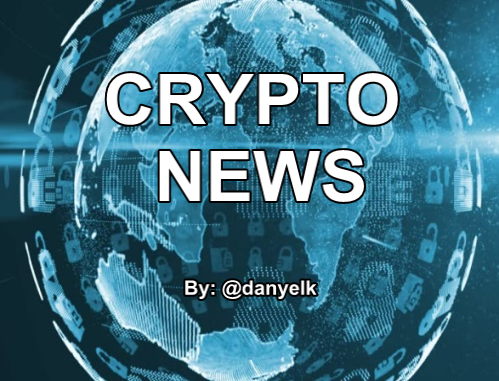
- ECB President Draghi: We don't have the Power to regulate Bitcoin!
- Hong Kong wants to benefit from China's Bitcoin ban!
- ETH Metropolis: Byzantine, the First Part of the Hardfork, starts on October 17th!
- Gold trader Sharps Pixley accepts Bitcoin!


Mario Draghi, President of the European Central Bank (ECB), is equating many central banks and regulators, commenting on regulatory measures on crypto currencies. However, he obviously pursues a slightly different approach from his colleges.
The market for crypto currencies is growing all over the world, which is not unnoticed by the individual states and their governmental institutions. In the last month, the central banks or regulators of many countries intensified efforts to contain and control the hitherto unregulated crypto market. In addition to the US financial market oversight SEC, the authorities in South Korea, China, Canada and the United Kingdom, among other things, had issued announcements in which it was announced to intervene regulatively.
Mario Draghi, President of the European Central Bank (ECB), the most important financial institution in the Eurozone, said in his opening speech to the European Economic and Monetary Affairs Committee (ECON) that he had no basis for concrete action by Bitcoin and others crypto currencies because "it is not really in our power" to regulate it or even to ban it altogether.
In addition, Draghi stated that the ECB had not yet fully discussed the exact potential of crypto currencies, but, like most other regulatory institutions, was aware of the opportunities and risks posed by the increased investment of the population in crypto currencies , The issue of cyber security is the top priority for the ECB
The ECB had previously expressed its opinion on a few opportunities for crypto currencies as well as for the application of Distributed Ledger Technology. So Mario Draghi himself had only a few weeks ago to the attempt of Estonia to set up their own national digital currency on the legs. He said that no member state of the Eurozone could introduce its own currency and thus included state-issued and controlled digital currencies. The only valid currency in the euro zone should always remain the euro.
The ECB, together with the Bank of Japan, had also tested the implementation of the DLT as a future payment processing system, but it was considered too unstable to replace the current real-time gross settlement system.

The Chinese special administrative area of Hong Kong is on the way to becoming an important center of blockchain technology and for digital currencies. The blockchain technology finds applications in those sectors that have a long tradition: in the shipping industry and the financial sector. The project also has moderate regulation in the city.
A growing number of entrepreneurs and politicians in Hong Kong see the tremendous opportunities of the technology on which Bitcoin is based. And they believe that the blockchain will not only revolutionize the financial services and the management of supply chains.
The entrepreneur Johnson Leung, for example, is operating the start-up 300cubits.tech in Hong Kong, which wants to use the blockchain technology for bookkeeping in the container business. The aim is to minimize the risk of default in loading agreements.
Johnson Leung said to Bloomberg:
Before Johnson Leung co-founded the start-up 300cubits.tech, he had worked for more than a decade in the financial sector. Among other things, he was a research analyst at JPMorgan Chase and at the Jefferies Group.
The Hong Kong government has also invested in the new technology itself. The central bank of the city council is currently developing its own crypto currency. It also tests the use of blockchains in commercial finance, mortgage applications and the tracking of electronic payments.
A government-sponsored research institute has worked on a blockchain based system for tracking property valuations. For the next year, the Hong Kong Stock Exchange is planning to launch a blockchain platform for young companies and investors.
Hong Kong's stock market supervision has joined the R3. This association of more than 80 of the largest financial institutions in the world headquartered in New York is working to make blockchain technology usable for traditional financial transactions.
"Blockchain has a very high priority for us," says Charles d'Haussy, Fintech's CEO at InvestHK, a government agency for economic development. But the positive environment for blockchain technology would not mean that Hong Kong is exhibiting a carte blanche to the sector.
Recently, the Financial Regulator advised investors to beware of fraud at Initial Coin Offerings (ICOs). At an ICO, a project collects investment funds using crypto currencies. In addition, the Authority warned that ICOs could be subject to local securities laws.
Hong Kong's Finance Minister Paul Chan said two weeks ago in an interview:
But from the harsh regulations in China, Hong Kong is far away. The Chinese authorities have recently also declared ICOs retroactive for illegal. They also pushed the country's Bitcoin exchanges to stop trading completely.
But the harsh action of the Chinese authorities makes Hong Kong only more attractive. It is true that the city state is under Chinese rule. But according to Aurelien Menant, head of Bitcoin's Gatecoin exchange, Hong Kong has an independent legal and regulatory system.
It was only last week that a blockchain conference organized by Bitkan, a Chinese trading company in the area of crypto currencies, was transferred from Beijing to Hong Kong. The reason was the prohibition of Initial Coin Offerings in China.
Roger Ver, CEO of Bitcoin.com, said in an interview with Bloomberg:
But not only Hong Kong is trying to become a center of blockchain technology. The regional rival Singapore also invests in its fintech sector. And in Dubai or Switzerland there are also efforts to attract blockchain companies.
In addition, Hong Kong has not had a success story with regard to technology start-ups. According to the CB Insights venture capital database, there is not a single start-up in the city state with a rating of one billion dollars or more. However, Hong Kong may help its financial sector. These include the early start-ups, including BitMEX, a crypto stock exchange for bitcoin derivatives, Bitspark, a money-issuing platform, and Kenetic Capital, a blockchain investment firm.
Charles d'Haussy, Fintech's CEO at the State Economic Development Agency InvestHK, expects that between 10 and 20 companies will be collecting investment funds in Hong Kong through Initial Coin Offerings.

The first part of the Metropolis-Hardfork of Ethereum has recently passed live in Testnet. On 17 October, the Hardfork will also begin in the real Ethereum network. To remain part of the network, users have to update their clients. But what will change with Metropolis? Is the Hardfork a great prank - or is it below expectations?
On October 17, Ethereum will enter the third phase of his life cycle. The first part of the Metropolis-Hardfork, Byzantine, will introduce some changes, which are not as fundamental as expected, but will nevertheless significantly alter Ethereum.
In the Ropsten testnet the Hardfork started already a week ago. In the Mainnet the Uprade is activated with block 4.370.000. All Ethereum clients, which are not yet updated at this time, will no longer be able to read dnan's new blocks. The Ethereum network gets a general update.
It was originally planned to switch from Proof of Work to Proof of Stake with the Metropolis phase. This would have removed the miners and their graphics cards from the system and replaced them with investors. This radical reform of the fundamental design of Ethereum will not take place with Metroplis. The Ethereum developers have moved them to the fourth and final stage of Ethereum, Serenity, to bake with Metropolis first smaller buns.
To better coordinate the Metropolis-Hardfork, it was split into two parts: Byzantine and Constantinople. The first part, Byzantine, will soon be there. But what will he bring with him? We look at the changes bit by bit and try to decipher them.
EIP 649: The Ice Age is coming to an end
The "Ice Age Algorithm" is currently causing the mining difficulty at Ethereum to increase exponentially. This is clearly evident at the moment, as the release of fresh ether goes back, while the block intervals are getting longer. This ice age has the sole purpose of forcing a hardfork. The least thing that the upcoming Byzantine-Hardfork has to do is to reset this "Difficulty Bomb". This is done with EIP 649. In other words, EIP 649 shifts the Ice Age by 18 months and reduces the Block Reward to 3 instead of 5 Ether. This is intended to prepare the system for the change to Proof of Stake to further reduce the distribution.
But, of course, EIP 649 is not the most important part of Hardfork. Instead, we have 7 major changes that are the result of long discussions of the Ethereum developers. They are, quite frankly, quite technical, and I have needed a while to understand what they mean. It may well be that I am wrong in detail, which is why I am grateful for any corrective comment.
The Byzantine-Hardfork affects 5 areas of Ethereum:
EIP 98: More parallelization through less state root calculation
Ethereum has a so-called state root: This is a special Merkle-Tree, which is a kind of proof of the entire state, ie of all active accounts and contracts. So far, this state root is recalculated after each transaction.
EIP 98 now removes this new calculation of the state root after each transaction. This makes it possible to parallelize the calculation of the State Roots more closely and to calculate generally less Merkle Roots. This will obviously help to save computing power. In addition, EIP 98 can make it possible to process not only the State Roots but also the transactions themselves in parallel. Which would further reduce the necessary computing power.
The shadow side of EIP 98 is that Fraud Proofs, with which Light Clients can check transactions, must be made up of the entire block. Since the blocks at Ethereum are quite small, this problem, at least now, is still very manageable.
EIP 658: Light clients can see if a contract has been executed correctly
EIP 98 makes the state root field unnecessary in transactions. EIP 658 now replaces it with another field, which provides information about whether a contract has been executed correctly. This makes it possible for Light clients that are not downloading the blockchain or the complete state to be able to see if a contract they retrieved or created had succeeded. This has not been possible up to now or needs the help of central middlemen.
This change can help Light clients interact better with contracts while remaining independent of middlemen.
EIP 100: Reward adjustment to the Uncles
In addition to the reduction of the rewards by EIP 649, EIP 100 also enters into the Mining Reward. It is about the so-called "Uncles." As with Bitcoin it can occur at Ethereum that a miner is about to find a block, but then is punched out by another miner. At Bitcoin, such blocks exist for a short time as "orphans" before the chain to which they belong dies. At Ethereum these blocks are called "uncles". Unlike Bitcoin, they are also rewarded. This is supposed to keep the mining fair.
So far, the reward for uncles has meant that, in some cases, the reward per block was slightly higher than the planned 5 ETH. With a new formula of difficulty adjustment, which also takes uncles into account, this error is eliminated.
EIP 198, 212, 213: Path free for zk-Snarks
The three EIPs 198, 212 and 213 allow more complex cryptographic operations within contracts, such as RSA, as well as the use of precompiled contracts on a particular elliptic curve. These changes make it possible to use the zk-Snark zero knowledge proofs that Zcash developers have invented.
These zk-Snarks are probably the most popular and most important feature of the Byzantine-Hardfork. They allow you to hide transaction and other state changes in a Zero Knowledge Proof. This allows the recipient to check whether a transaction is correct without the sender being published this unencrypted.
A transaction with zk-Snark Proof would cost considerably more gas than ordinary transactions. But it brings the long-needed privacy to Ethereum.
The first transaction with a zk-Snark Contract was already built on the Ropsten Testnet.
Most of the changes to Byzantine-Hardfork concern the Contracts. There are again very unimpressive upgrades, but they can have a big effect.
EIP 214 Safe call up of other contracts in a contract
There may be cases where smart contracts call other contracts while they are processing a process. So far, there is the problem that the inner contract, ie the one called, has priority. It is even possible for him to change the external contract, that is, the one who called him. This complicates the interaction between smart contracts and has led to the DAO bug.
By introducing the code STATICCALL with EIP 214, this can be prevented by not allowing changes to the state during a call to a contract. This makes the construction of complex smart contracts safer.
EIP 211 Better return of data in a contract
A problem in the previous contracts of Ethereum is the return of data. The contract makes an operation, this operation has a result, and the contract returns this. The problem is that you need to know beforehand how big that data is. If not, it becomes problematic and causes chaotic or extremely high gas prices. With the introduction of the two new codes RETURN DATA SIZE and RETURN DATA COPY with EIP 211, the size of the data to be received can be flexibly recalculated.
EIP 206 Favorable withdrawal of a state
With the op-code REVERT introduced by EIP 206, the execution of a change of the state can be stopped and these can be withdrawn without consuming all the gas. So far this is only possible via complex and expensive detours. With the new codes, it is not only cheaper but it is also possible to return a reason for the withdrawal.
Closing words
The changes that the first part of the Metropolis-Hardfork brings with it are very technical and difficult to estimate. It's about the details.
Apart from zk-Snarks does not seem to change much for the user. It may be possible to use light wallets to better interact with contracts, perhaps the structure of the state will go faster in the future, and the new op-codes for smart contracts will allow a better, more straightforward and safer interaction of smart contracts.
A dirty Hardfork, with which there is to the permanent cleavage of the chains, is not to be expected. Unlike the DAO-Hardfork, which has led to the emergence of Ethereum Classic, there seems to be a complete consensus for the Metropole in the Ethereum community. After all, this Hardfork does not undo any events and has long been announced. The Ice Age, which is currently threatened, makes a Hardfork anyway inevitable.

Since 1778 Sharps Pixley exists as a traditional place for gold bars and gold coins. The traditional company in the heart of London has accepted Bitcoin as a means of payment since yesterday.
From Speakers and Creators
Whoever wants to achieve a high status can, in principle, go two ways: to build a valuable system that will meet the status, or to lower other systems in order to raise its own in relation higher.
A gold example of this is gold investor Peter Schiff, who had recently described Bitcoin as a bubble or a worthless asset in an interview with CNBC. While JPMorgan's CEO, Jamie Dimon, is also a member of this series, Sharps Pixley is more likely to be the one to spot opportunities.
Since 26 September, Bitcoin has been an accepted payment for London's largest gold dealer.
The CEO Ross Norman said:
BitPay, whose CEO also seems pleased, is acting as payment service provider:
Giles Maber, Business Development Director at Sharps Pixley, commented: "We bridge the gorge between the world's oldest and most recent currency."

I wish you all a lovely Wednesday!!!
Best regards
@danyelk
.gif)


